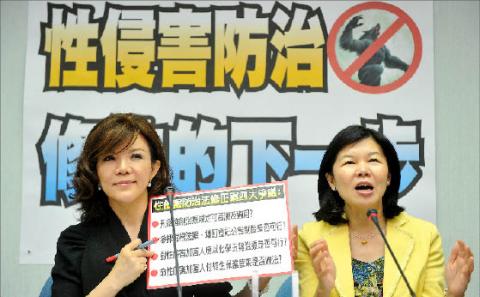The chemical castration of repeat sex offenders is a form of therapy, not a punishment, and it does not need to be written into law, a Chinese Nationalist Party (KMT) lawmaker said yesterday.
KMT Legislator Pan Wei-kang (潘維剛) said that in a number of public hearings organized to discuss amendments to the Sexual Assault Crime Prevention Act (性侵害犯罪防治法), a majority of specialists and academics agreed that the chemical castration of repeat sex offenders should be considered therapeutic intervention. If that definition receives broad public acceptance it would not be necessary to insert a new clause into the law to authorize its use in specific cases, Pan said.
Echoing Pan’s views, Food and Drug Administration Deputy Director Wang Tsung-hsi (王宗曦) said chemical castration is purely a medical matter. Since chemical castration is not part of the penalty regime for offenders there was no need to amend the law to implement it, he said.

Photo: Chien Jung-fong, Taipei Times
However, Ministry of Justice Chief Secretary Tsai Ching-hsiang (蔡清祥) said the Criminal Law would have to be amended in order to carry out the chemical castration of sex offenders.
If chemical castration is to be used as a form of punishment, the penal code must first be amended, Tsai said.
According to Pan, legislators from across party lines have agreed to prioritize the screening of revisions to the Sexual Assault Crime Prevention Act.
“The KMT will see to it that the amendments are passed in the next legislative session,” Pan said.
The issue of chemical castration was raised in March after a repeat sex offender allegedly raped and murdered a teenage girl shortly after his release from prison. The man was released in February and was scheduled for his first rehabilitation counseling session on April 1.

A preclearance service to facilitate entry for people traveling to select airports in Japan would be available from Thursday next week to Feb. 25 at Taiwan Taoyuan International Airport, Taoyuan International Airport Corp (TIAC) said on Tuesday. The service was first made available to Taiwanese travelers throughout the winter vacation of 2024 and during the Lunar New Year holiday. In addition to flights to the Japanese cities of Hakodate, Asahikawa, Akita, Sendai, Niigata, Okayama, Takamatsu, Kumamoto and Kagoshima, the service would be available to travelers to Kobe and Oita. The service can be accessed by passengers of 15 flight routes operated by

Alain Robert, known as the "French Spider-Man," praised Alex Honnold as exceptionally well-prepared after the US climber completed a free solo ascent of Taipei 101 yesterday. Robert said Honnold's ascent of the 508m-tall skyscraper in just more than one-and-a-half hours without using safety ropes or equipment was a remarkable achievement. "This is my life," he said in an interview conducted in French, adding that he liked the feeling of being "on the edge of danger." The 63-year-old Frenchman climbed Taipei 101 using ropes in December 2004, taking about four hours to reach the top. On a one-to-10 scale of difficulty, Robert said Taipei 101

Taiwanese and US defense groups are collaborating to introduce deployable, semi-autonomous manufacturing systems for drones and components in a boost to the nation’s supply chain resilience. Taiwan’s G-Tech Optroelectronics Corp subsidiary GTOC and the US’ Aerkomm Inc on Friday announced an agreement with fellow US-based Firestorm Lab to adopt the latter’s xCell, a technology featuring 3D printers fitted in 6.1m container units. The systems enable aerial platforms and parts to be produced in high volumes from dispersed nodes capable of rapid redeployment, to minimize the risk of enemy strikes and to meet field requirements, they said. Firestorm chief technology officer Ian Muceus said

MORE FALL: An investigation into one of Xi’s key cronies, part of a broader ‘anti-corruption’ drive, indicates that he might have a deep distrust in the military, an expert said China’s latest military purge underscores systemic risks in its shift from collective leadership to sole rule under Chinese President Xi Jinping (習近平), and could disrupt its chain of command and military capabilities, a national security official said yesterday. If decisionmaking within the Chinese Communist Party has become “irrational” under one-man rule, the Taiwan Strait and the regional situation must be approached with extreme caution, given unforeseen risks, they added. The anonymous official made the remarks as China’s Central Military Commission Vice Chairman Zhang Youxia (張又俠) and Joint Staff Department Chief of Staff Liu Zhenli (劉振立) were reportedly being investigated for suspected “serious